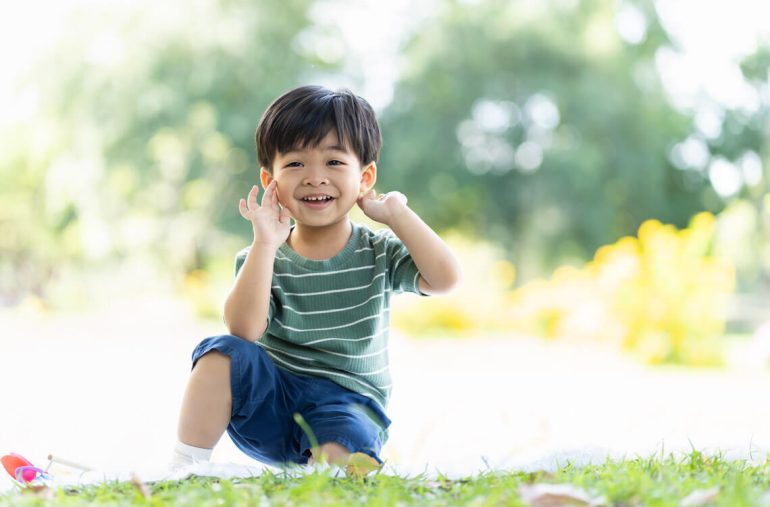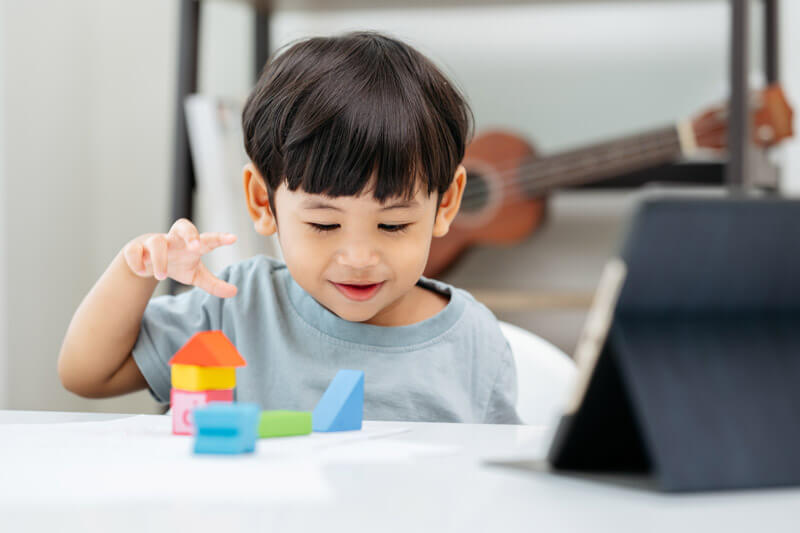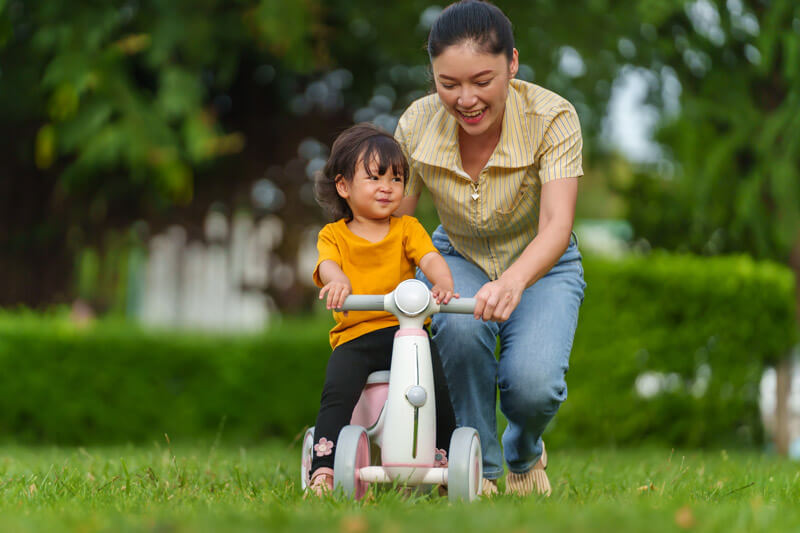Eighteen months is an energetic, noisy, and wonderfully messy time in your toddler’s life. Their 18-month-old developmental milestones will be full of energy and determination.
Your toddler is suddenly more confident on their feet, more curious about the world, and more determined to try things for themselves.
Use this guide as a friendly map to your child’s 18-month-old developmental milestones.
But remember that each child follows their own path.
Physical & Motor Milestones
Faster Running
By 18 months, many children walk well and begin to run with increasing assurance, even if their speed is more enthusiasm than grace.
They enjoy climbing onto sofas, low chairs, and playground steps, and they frequently practise squatting down to pick up toys and standing back up again.
Greater Coordination
Coordination improves, so you may see them push and pull toys while walking, attempt to kick a ball, or try dropping and stacking objects to see what happens. These physical experiments build strength and spatial awareness every day.
They may also begin to manage small stairs with help. This is a time for safe challenge.
Their hands grow steadier too, allowing them to hold a crayon and make deliberate marks. These first scribbles are important practice for later drawing and writing.
Communication & Cognitive Development
Expanding Vocabulary
Language tends to expand quickly around this age, and many toddlers now use a handful of clear words and several more that only the family understands.
They might point to ask for something, shake their head to refuse, and sometimes combine two words such as “more juice” or “Mummy, up!”
Understanding usually outpaces speaking, so your child may follow simple instructions like “come here” or “give me the ball”, even if they cannot yet say all the words themselves.
Learning Through Imitation
Imitation is a powerful learning tool at 18 months. Children copy household routines, pretend to talk on a toy phone, and mimic simple chores.
Problem-solving skills also grow; they try slightly harder puzzles, remember where toys are kept, and enjoy cause-and-effect play, such as pressing buttons to hear a sound.
These activities help memory and early reasoning.
Social & Emotional Development
Expressiveness
Emotionally, toddlers are more expressive and clearer about their preferences now, which can mean joyful cuddles and dramatic refusals in quick succession.
They are keen to assert independence, often saying “no” as a way to practise boundary-testing and self-control. This behaviour can be exhausting, but it is a normal part of building a sense of self.
Parallel Play
Attachment remains crucial; many toddlers still seek comfort from familiar carers when they are upset or tired. Short separations may be easier than they were, but predictable routines continue to offer great reassurance.
Social play at this stage is mostly parallel — toddlers play beside other children rather than with them — though occasional cooperative moments, like offering a toy or copying a clap, begin to appear.
These small social sparks are the first steps toward sharing and teamwork.
Sensory & Perceptual Development
Sensory Exploration
Your toddler’s senses work together to build richer understanding.
They enjoy exploring textures, whether that means squishing playdough, pouring water, or feeling the roughness of a bark on a tree.
Taste exploration is common too, and favourites may emerge alongside firm dislikes for certain textures or flavours. These preferences are normal and can change over time.
Facial Recognition
Visual and auditory skills sharpen at 18 months, so your child can spot familiar faces across a room and turn quickly toward a favourite song.
Books with large, clear images hold their attention, and songs with repeated verses support memory and speech development.
Sensory play is both fun and formative, and supervised messy time is often the best classroom at this age.
When to Talk to a Paediatrician
Every child develops at their own pace, but you should contact your paediatrician if you have concerns about several areas at once.
Seek advice if your toddler:
- is not walking at all
- shows very little interest in communicating through gestures or vocal sounds
- does not respond when called by name
- seems excessively floppy or very stiff
- is losing skills they formerly had
Early reassurance and the right support can make a real difference. It is always okay to ask for help.
Remember to keep track of your toddler as they progress in their 18-month-old developmental milestones, parents!
Expert Tips & Daily Activities
Offer Choices
Make daily routines into learning moments by talking through them, naming objects, and offering simple choices.
For example, ask, “Red cup or blue cup?” to encourage decision-making, then praise their choice. Short, varied play sessions throughout the day suit toddlers better than long activities, and rotating a few favourite toys keeps interest high.
Outdoor Time
Outdoor time is especially valuable; safe climbing on low steps, toddling on grass, and chasing bubbles help build balance and confidence.
Reading Together
Reading together remains one of the most effective ways to boost language — keep stories short, interactive, and frequent.
Mental Stimulation
Sensory trays with water, rice, or safe dough provide curious hands with new textures to explore, while simple puzzles and stacking games support problem-solving and fine motor skills.
Provide Comfort
When tantrums erupt, offer calm reassurance rather than punishment.
A steady routine, clear limits, and moments of warm connection help toddlers learn emotional regulation over time.
You will not always get it right, and that’s okay.
Stepping Stones Ahead
Eighteen months is a stage of bold attempts and small refinements. Your toddler will wobble, shout, laugh, and copy you in equal measure, and each action is a piece of learning.
Celebrate the noisy, sticky, lively moments, because they matter more than perfect behaviour or neat toys.
With patience, gentle boundaries, and lots of talk and play, your child will continue to make steady strides in their 18-month-old developmental milestones.
Disclaimer: The information provided in this article is for informational purposes only and should not be considered as medical advice from Motherhood. For any health-related concerns, it is advisable to consult with a qualified healthcare professional or medical practitioner.
For more insightful stories and fun recipes, stay tuned to Motherhood Story!













